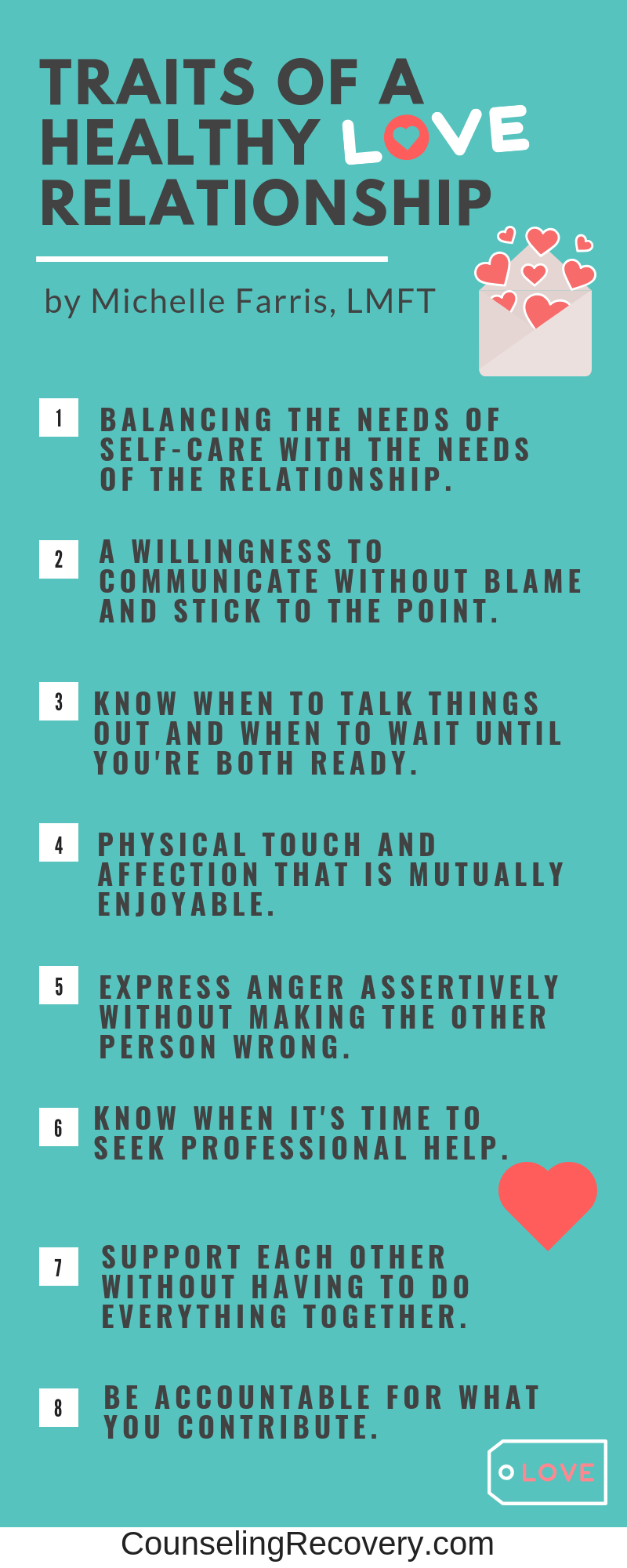Traits of a Healthy Relationship
What exactly is a healthy relationship? You might not think much about it until you need to.
Here is a mini-checklist to assess your relationships. It's important to be able to see both your strengths and weaknesses. That's how you grow - by taking the time to acknowledge progress and move towards change. Focus on making one change at a time because that's more doable than doing too much then losing interest.
1. Balancing Needs of the Relationship with Self-care
In a healthy relationship, there's a balance of give and take. If there isn't the relationship starts to suffer.
Example: Susan gave up her workouts because it cut into family time. Because of that, her stress increased and she started to feel depressed.
Lesson: When you give up what you need, you pay a price.
When you put the needs of the relationship ahead of yours, it's a sign of codependency. Learning how to take care of yourself and detach helps. You don't always need to put others first.
Click here to read Are You Codependent?
2. A Willingness to Communicate without Blame
Communication is the number one problem in relationships.
By using "I statements" the focus is on you and avoid blame or criticism. Whenever you start a sentence with "you" it goes downhill fast. Simple but effective.
3. Knowing When to Talk and When to Walk
Knowing how and when to talk things out is the key to building a healthy connection.
The typical argument starts when one person wants to talk NOW instead of waiting until both are ready. Forcing a conversation never works out well.
Example: Matt comes home frustrated and immediately criticizes how dirty the house is, but Sherry is exhausted after being home all day with the baby.
Lesson: The best time to talk is when both people are ready. When you can talk, listening is much easier.
4. Physical Affection that is Mutually Enjoyable
A physical relationship fades for two reasons. The friendship is damaged because you no longer feel known or supported by your partner. Or, you are holding onto old hurts or resentments that need to be healed.
Healing relationships often means seeking outside help. Couples workshops are a great way to get some healing done fast. Plus it usually means a weekend away!
A lack of affection starts an emotional disconnect that is hard to fix. Rebuilding the friendship is the starting point.
5. Ability to Express Anger Without Making the Other Person Wrong
Very few people grow up with healthy role modeling around anger. Yelling and name calling are common but they do damage. Saying how you feel without blame is the goal.
Example:
"I'm really angry that you didn't help me clean up after the party. I'd appreciate if you could do the leftover dishes."
Instead of: "You make me so mad because you never help out when we have company!"
The first one focuses on the facts, but the second one is a judgment and by using the word "never" it becomes an attack.
6. Recognize When You Need Professional Help
Couples wait an average of six years before getting help. Even if you are the only one wanting help, that is enough to make positive changes in the relationship. It starts with you.
7. Support Each Other without Having to Agree
Getting agreement isn't always necessary to have good communication!
Every couple has "grid-lock issues" which according to The Gottman Institute consists of differences that don't change over time. These consist of personality traits or differences in values. So the more realistic (and attainable) goal is giving validation. Basically, it's telling the other person that you can see their point of view. You don't have to agree to validate!
Pick one relationship skill and go!
It's easier to focus on one skill until you've mastered it. Share this blog with your partner and talk about which ones are strengths and which ones need work. Or, volunteer which ones you want to work on and lead by example. Sometimes, that's the most powerful tool you have.


